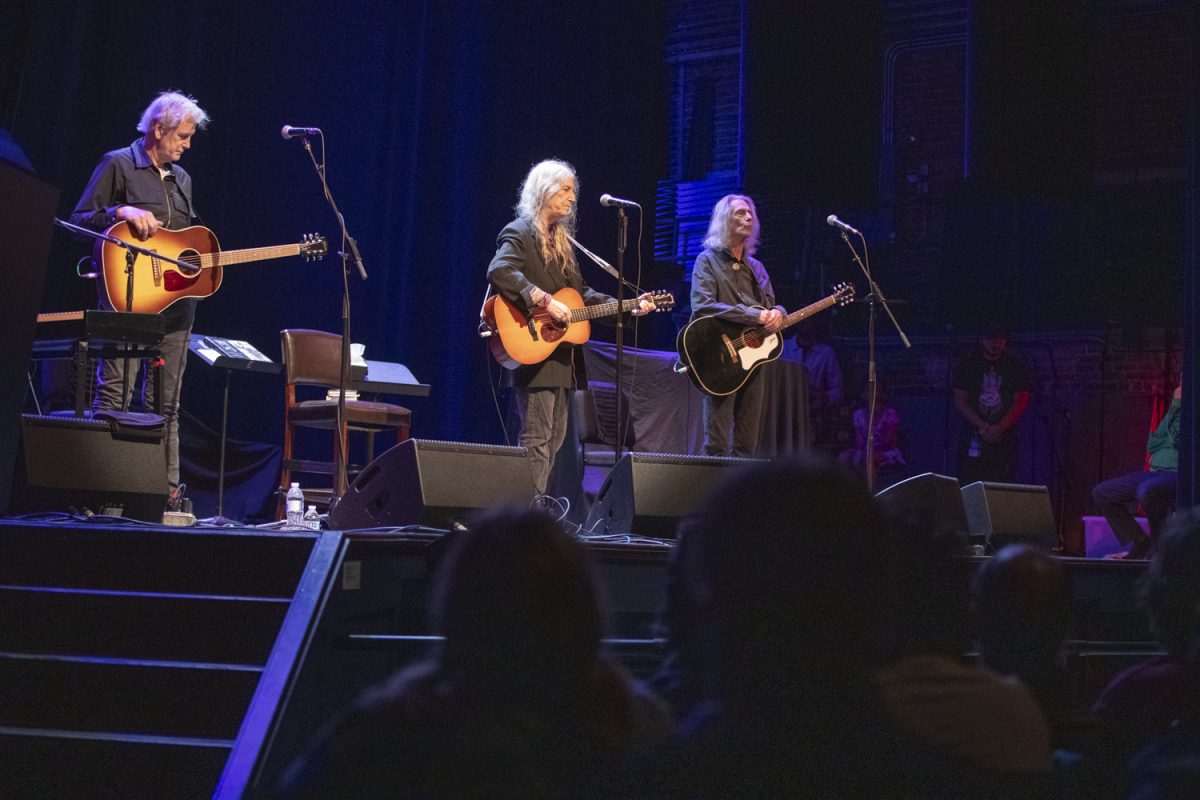Iowa City audience members brought the punk to The Englert Theatre on Friday night — or, as close to punk as Iowa City could offer the iconic Patti Smith.
A multigenerational group of fans lined up from the Marquee to South Dubuque Street, eager to hear a night of poetry readings with the legendary Rock and Roll Hall of Fame inductee and National Book Award winner.
Smith was invited to Iowa City as a part of the University of Iowa’s Infinite Dream Festival.
“Infinite Dream is a festival or series of events that reflect on the many threads of the American story,” Andre Perry, executive director of Hancher Auditorium and the Office of Performing Arts and Engagement at the UI, said.
This multidisciplinary event has featured discussions, readings, and presentations around Iowa City.
“In some ways, the most fun part is just kind of getting out of the way and letting students and artists just, like, figure stuff out together,” Perry said.
Often hailed as the “Godmother of Punk,” Smith made her name in New York in the late 1960s and early 1970s. A musician, poet, author, and artist, she epitomized the notable avant-garde scene of the Chelsea Hotel, where she lived with Robert Mapplethorpe.
Smith is also credited with challenging ideas about gender and breaking down barriers for women in the music industry.
“[Patti] broke the mold. She started a new tradition of women being tough without it being a gender-specific kind of toughness,” Steven Horowitz, a retired UI professor who taught 40 years of classes on rock and roll, said.
Horowitz cited Patti Smith as a seminal figure in his curriculum on the punk scene.
“Punk was a male phenomenon, except people like Blondie,” Horowitz said. “Patti Smith was an androgynous figure who stood for the idea that you can be whatever you want. You don’t have to fit a role.”
Smith’s relaxed style and comfort in her own skin was on full display as she took the stage in The Englert Theatre, donning a men’s flannel and suit jacket.
She was accompanied by longtime guitarists and songwriting partners Lenney Kaye and Tony Shanahan.
Smith began her set with a disclaimer, warning her audience that she was “an extremely disciplined, undisciplined person.”
Before long, the setlist was all but abandoned, and the night evolved into a scattered but endearing hour of impromptu performances, shuffling paper, and side conversations with her band.
“I specialize in disaster,” she quipped to the audience, as she weaved between poems, passages, and songs, dedicating many to her various artistic muses, including master printmaker and poet William Blake and peace activist Rachel Corrie.
The following night, Smith performed at Hancher Auditorium — a stark contrast to the intimate chaos of the Englert — to perform some of her most famous hits. She had much of the crowd on its feet with a powerful and resonant voice.
As a scholar of subculture and a punk music fan, Horowitz was not thrilled about the choice of venue for an icon of ‘70s punk.
“[Hancher] is a classy place. Is there going to be a mosh pit? I can’t imagine they will let that happen,” Horowitz said. “She belongs at venues that no longer exist in Iowa City, where you don’t have to sit in your seat and clap politely.”
While Smith filled the room with her signature raw, nonconformist energy, the rows of seats and polite applause from the audience gave the auditorium an air of propriety that stifled any possibility of a true punk-rock experience.
That is not to say that Smith’s performance was restrained; Smith’s rendition of Nirvana’s “Smells Like Teen Spirit” was nothing short of a punk-rock sermon, complete with fierce howls and vigorous head-banging.
Matt Muir came from Cincinnati, Ohio, and it was his 15th time seeing Smith live.
“She doesn’t play very often. It’s hard to catch a Patty Smith show,” he said. “I mean, the musicianship is so killer, and she comes in with her poetry and her words, and it just blows your mind.”
Before closing out the night, Smith addressed the crowd of her adoring fans. “This is our first time in Iowa City, and I have to say for myself at least, it won’t be the last,” she said, as the night’s final song was lost to applause.



